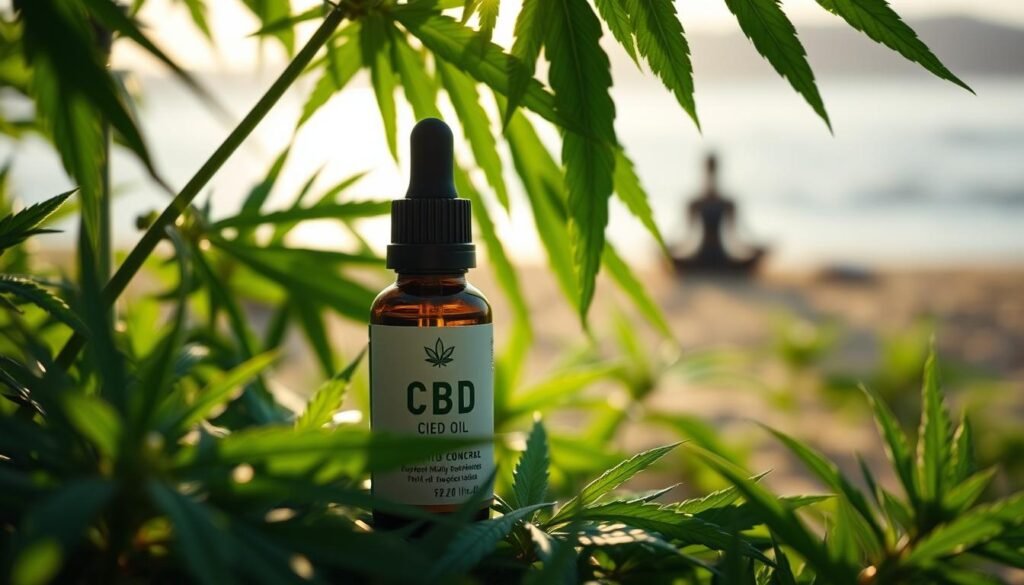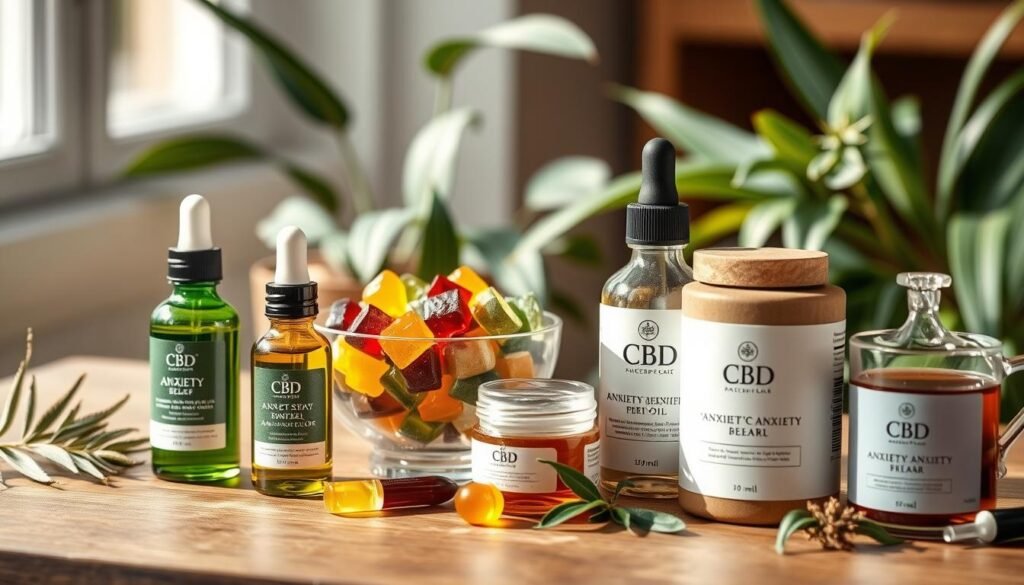A study in the Journal of Cannabis Research shows people use CBD for anxiety relief. Many people are looking into natural ways to deal with mental health issues. Hemp-derived CBD is being explored for anxiety and OCD.
It might calm anxiety symptoms. This makes it a natural treatment to think about. Scientific studies support this idea, seeing CBD’s calming effects.
The 2018 Farm Bill changed hemp’s legal status. Now, products with less than 0.3% THC are legal in the U.S. This change helps those wanting anti-anxiety benefits without THC’s high. Research on CBD’s help with anxiety and OCD keeps growing. Understanding how CBD works is key for those looking for mental health solutions.
Key Takeaways
- A significant percentage of CBD users report anxiety as their primary reason for use.
- Hemp-derived CBD is federally legal if it contains less than 0.3% THC.
- Studies suggest CBD may aid in managing anxiety and OCD symptoms.
- More research is required to establish CBD’s effectiveness for OCD.
- Different CBD products and dosages are available for mental health support.
Understanding CBD: A Natural Alternative
CBD, short for cannabidiol, is gaining popularity as a natural treatment. It helps with conditions like anxiety and obsessive-compulsive disorder (OCD). It comes from the cannabis plant but doesn’t make you “high” like THC.
What is CBD?
CBD stands out in the cannabis family for its health benefits. Unlike THC, it doesn’t affect your mind. Instead, it works with your body to bring about balance. People use cbd oil anxiety relief products to feel better and manage anxiety.
The difference between CBD and THC
It’s important to know how CBD and THC are different. THC makes you high, but CBD doesn’t. This makes CBD a safer choice for treating anxiety and OCD. Thanks to the 2018 Farm Bill, hemp-derived CBD is legal in the US. It’s okay if it has 0.3% THC or less.
Looking for trustworthy CBD products? Check out guides on finding the best ones for managing anxiety and OCD.
How CBD Works in the Body
The way CBD interacts with our bodies is truly fascinating, especially when we talk about mental health. People are studying how CBD might help with anxiety and OCD. The key player here is the endocannabinoid system. It helps keep our body balanced in many ways.
The endocannabinoid system
This system is made of receptors, endocannabinoids, and enzymes. They all work to keep everything in balance. There are two main types of receptors: CB1 and CB2. CB1 receptors are mostly in the brain.
They affect our mood and how anxious we feel. Studies suggest CBD might influence these receptors. This could explain why CBD seems to calm people down. It might change brain activity in places that control anxiety. This looks promising for treating anxiety disorders and OCD.
Potential neuroprotective effects of CBD
CBD might also protect brain cells, which is great for those with anxiety and OCD. Early studies show CBD could ease anxiety and stress. This might make it useful in mental health care. Animal research points to CBD helping with stress and anxiety effects.
Most people handle CBD well, with few having minor, short-lived issues. More research shows CBD could be a big help in mental health. It seems to be safe for most users.

CBD for Anxiety and OCD: Current Research
Recent research shows more people are looking into CBD’s role in treating anxiety and OCD. Many are hoping CBD can be a new way to handle OCD and anxiety symptoms. Here, we’ll look at the latest findings on how CBD might help with these issues.
Studies on CBD’s effects on anxiety disorders
About 29% of people in the U.S. will face anxiety disorders at some point. The treatments we have don’t always work well, leaving many still struggling. This is why researchers are considering CBD as an additional treatment option.
CBD is known to be safe in doses up to 1500 mg/day for most people. This means it could be a viable part of treating these conditions without too many side effects.
Recent findings regarding CBD and OCD symptoms
Research into CBD for OCD is just starting, but some results are promising. One study showed using cannabis led to less anxiety and fewer compulsions in people with OCD. These findings are from over 1,800 sessions, which gives us a good look at real-life effects.
High levels of CBD were linked to bigger drops in compulsions, pointing to its potential in OCD treatment. However, a study in 2020 found that CBD didn’t make a big difference in OCD symptoms. This tells us that more studies are needed to really understand if CBD can help.

| Study Aspect | Findings |
|---|---|
| Lifetime Prevalence of Anxiety Disorders | 29% of the U.S. population |
| Response Rates of Current Pharmacological Treatments | Limited response rates and residual symptoms |
| Adverse Effects | Limit tolerability and adherence to treatments |
| Maximum Tolerable Dose of CBD | Up to 1500 mg/day |
| Reduction in Compulsions after Cannabis Use | 60% reduction reported |
| Reduction in Anxiety after Cannabis Use | 52% reduction reported |
| Study on CBD and OCD Symptoms | 2020 study found inconclusive results |
Although CBD shows promise for OCD, we need more thorough research. The ongoing study of CBD’s benefits remains hopeful. However, we must be careful, especially when it comes to mental health.
Best Forms of CBD for Managing Symptoms
Many people look for relief from anxiety and OCD with CBD products. There are different forms available, each with its own advantages. Knowing your options helps you choose the right product for your needs.
CBD oils and tinctures
CBD oil anxiety relief is common with oils and tinctures. They work fast when taken under the tongue. This is because they enter the bloodstream quickly. You can find them in various strengths, suitable for both newbies and experienced users. Brands like Vedi Wellness focus on clean extraction and full-spectrum products.
CBD gummies and edibles
CBD gummies and edibles are tasty and easy to use. They’re great for controlling how much you consume. They might work slower than oils but are discreet for daily use. People enjoy their familiar flavors and textures.
CBD capsules and topicals
Capsules are a straightforward way to take CBD. They’re easy to add to any supplement plan. Though they might cost more than oils, they don’t have any taste. For spot relief, creams and lotions are good. They focus on specific areas, adding to the overall benefits of CBD for anxiety and OCD.

Choosing the right CBD form is crucial, and advice from a healthcare provider is helpful. Tailored advice helps ensure effective symptom management with CBD products. Focusing on quality and what you like makes the search for natural relief more successful.
Dosing Recommendations for CBD
Finding the right CBD dose matters a lot for anxiety and OCD. You need to adjust it to fit your health and response. This makes the CBD work better for you.
Suggested starting doses for anxiety
Experts often suggest starting with 20 to 40 mg of CBD daily for anxiety. Depending on your body’s reaction, this amount may change. Studies say 300 to 600 mg might work well, but it’s safer to start lower. Making changes based on personal response helps find the best dose without bad side effects.
Adjusting dose for OCD symptoms
For OCD, starting low and slowly upping the dose is key too. People often find they can handle 20 mg to 1,500 mg daily. Checking how symptoms change helps fine-tune the dosage. Using inhaled CBD offers quick help for strong symptoms. Products like tinctures and capsules are good for longer-lasting effects.
Pros and Cons of Using CBD for Mental Health
CBD offers an interesting angle on mental health. It can ease anxiety, which is great for people looking for different treatments. Yet, everyone should know about possible side effects. These can range from slight to more serious problems.
Potential benefits of CBD for anxiety relief
Studies suggest CBD could help lessen anxiety symptoms. It does this by affecting certain brain receptors. A study in 2011 showed that people with social anxiety felt much better after taking 400 milligrams of CBD.
CBD could also lower panic attacks and aid with PTSD symptoms. Benefits mentioned include:
- Reduced anxiety levels
- Improved sleep quality
- Enhanced overall mood
- Lowered stress responses
Possible side effects and risks
When discussing CBD, it’s key to look at its downsides. Potential side effects are:
- Gastrointestinal issues
- Tiredness or fatigue
- Changes in appetite
- Dizziness
- Dry mouth
Despite having fewer side effects than some meds, not all CBD products are reliable. Always buy from trusted sellers. They should offer third-party lab results, proving their products are safe and work well.
| Benefit | Potential Side Effect |
|---|---|
| Reduced anxiety | Gastrointestinal issues |
| Improved sleep | Tiredness |
| Enhanced mood | Dizziness |
| Lowered stress | Changes in appetite |
| Ease of use | Dry mouth |
Choosing the Right CBD Products
Finding the best CBD products can be tough with so many options out there. You should look at a few key things to make sure the products are safe and work well. Knowing what to look for helps you make a good choice in the cbd market.
What to look for in CBD products
When looking at CBD products, always check if they have a certificate of analysis (COA). A COA comes from a trusted lab and shows the product’s strength. It also makes sure it doesn’t have bad substances. Here are more tips to help you pick the right product:
- Source of Hemp: Hemp grown in the U.S. usually follows strict rules.
- Ingredients List: Choose products with simple ingredients and no fake additives.
- Type of CBD: There are three kinds: full-spectrum, broad-spectrum, and isolate. Full-spectrum has all cannabinoids, broad-spectrum leaves out THC, and isolate is just CBD.
Importance of third-party testing
Third-party testing for cbd makes sure products are safe and effective. Independent labs check for bad substances like pesticides or heavy metals. Some CBD items without regulation might be contaminated. So, testing by someone else is key. Pick companies that show their test results openly on their websites or packages.
Reading reviews and stories from other users helps too. It gives you more info on what to expect. To learn more about CBD, check out detailed guides on choosing CBD products.
Consulting a Professional Before Use
Consulting a healthcare professional is crucial before adding CBD to a treatment plan for anxiety or OCD. Talking to a doctor about CBD can provide insights specific to individual health needs, considering the unique factors of CBD use.
Discussing CBD with your doctor
Starting a conversation with doctors about CBD is important. This talk can clear up concerns about medication interactions with cbd when using other medicines. Doctors can then weigh the risks and benefits, offering guidance that considers medical history and current medications for safe, effective use.
Monitoring interactions with other medicines
Watching how CBD and other medications interact is essential. Many medications can affect or be affected by CBD’s metabolism. Keeping an eye on this helps avoid negative effects and improve benefits. It’s crucial for patients to tell their healthcare providers about all supplements, including CBD, ensuring a well-rounded health plan. For more on natural anxiety relief supplements, check out this resource.
Conclusion
Learning about CBD and its benefits for anxiety and OCD is critical. These conditions affect 1-3% of people worldwide. Genetic and environmental factors play a role. That’s why trying different treatments can help those in need.
CBD has helped many people feel better. It’s good for reducing anxiety and obsessive actions. This makes it a valuable addition to their healing strategies.
The summary of CBD for anxiety suggests that oils, tinctures, and gummies might help. But, it’s important to keep researching. Every person is different. So, talking to health experts before starting CBD is smart.
Thinking about using CBD? First, learn how it works and what rules apply. The CBD world is changing fast. To get the best from it for mental health, finding the correct dose and product matters.